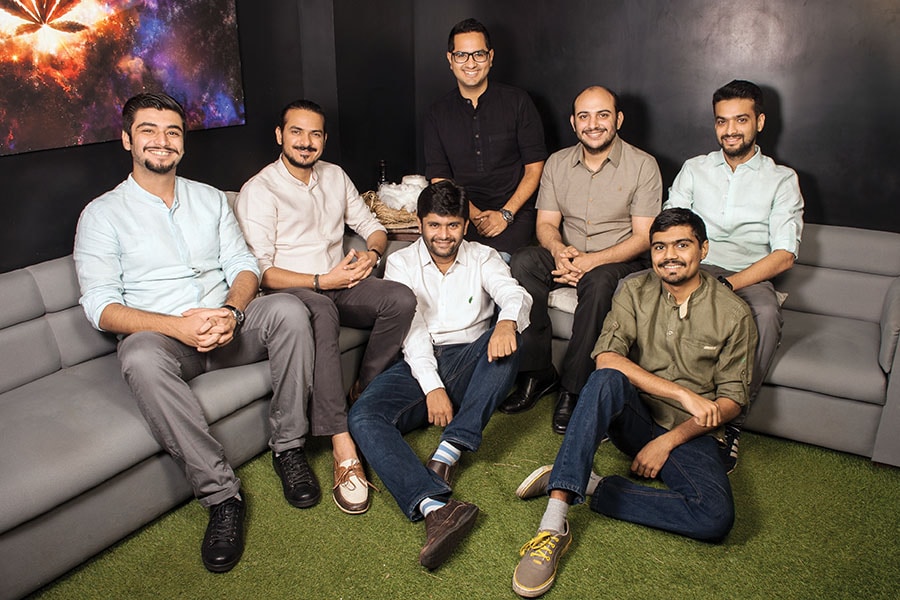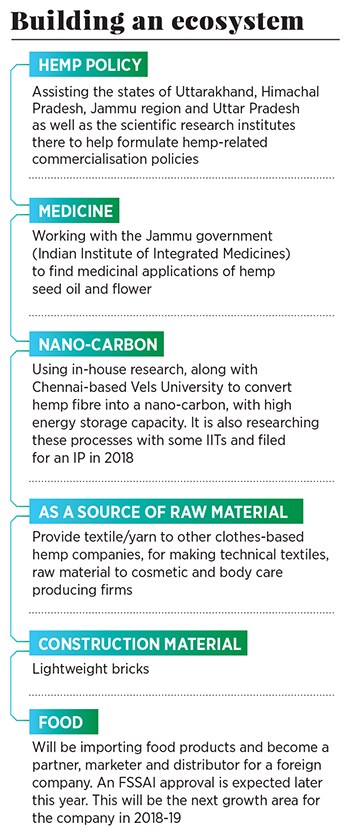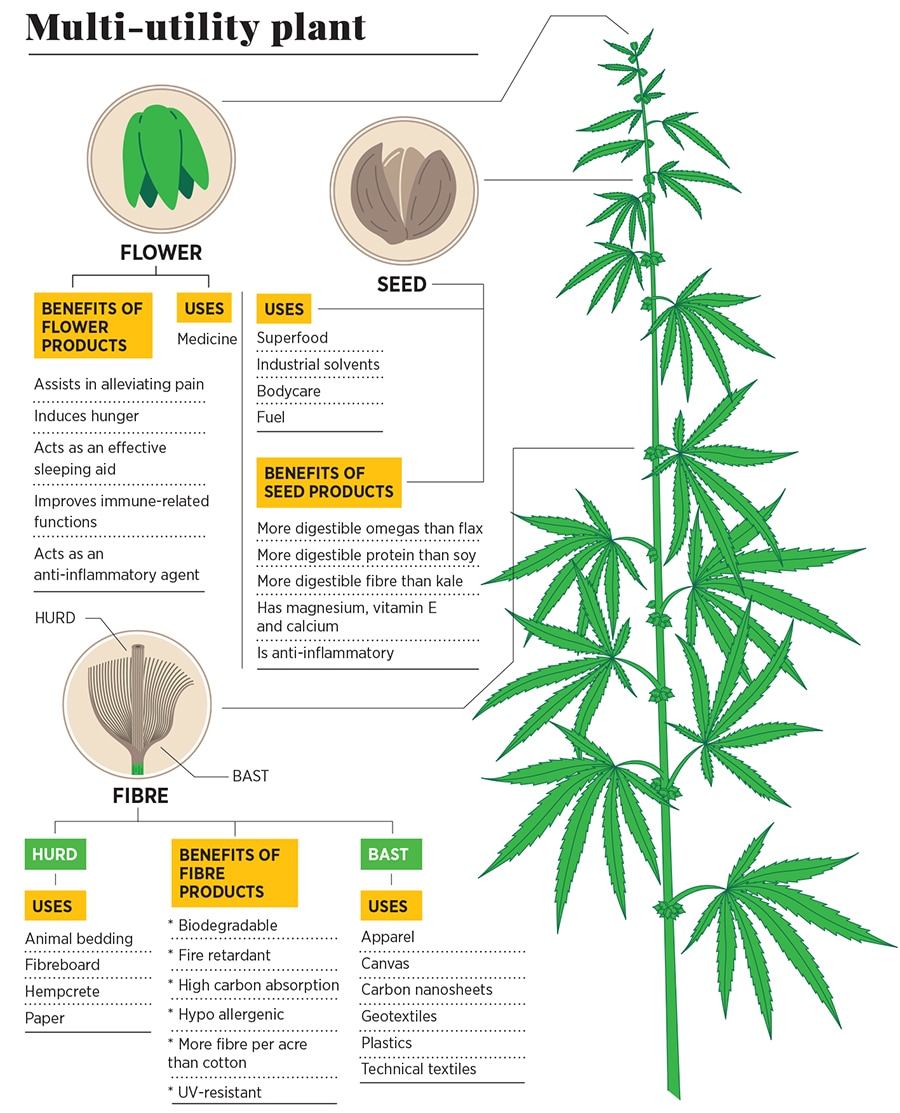On the hemp trail: Boheco's attempt to build a new narrative around cannabis
The company is trying to find sustainable uses for the controversial plant


 Team Boheco: Seated on sofa (from left): Delzaad Deolaliwala, Chirag Tekchandaney, Sanvar Oberoi, Jahan Peston Jamas and Yash Kotak. On the floor: Avnish Pandya (left) and Sumit Shah
Team Boheco: Seated on sofa (from left): Delzaad Deolaliwala, Chirag Tekchandaney, Sanvar Oberoi, Jahan Peston Jamas and Yash Kotak. On the floor: Avnish Pandya (left) and Sumit Shah
Image: Aditi Tailang
It was on a road trip to Australia with his family in 2010 that Jahan Peston Jamas, one of the seven co-founders of startup Boheco, realised the potential of hemp. They had been travelling through the southernmost parts of Western Australia, from Perth to Albany, and went past ghost town after ghost town until they came across Margaret River, which stood out as a flourishing town.
After speaking to a range of people, from stationery shop owners to real estate agents and art gallery curators, “it emerged that wine growing and selling hemp-based products were the big businesses there," recalls Peston Jamas. This included the Margaret River Hemp Company, one of the largest Australian hemp companies that made everything from fabrics and body care products to surfboards and food from hemp.
Back home, his friends and he had been thinking of a business idea and here was one that intrigued them all. “The fact that there was a product that was completely misperceived and yet could be given a global perception was amazing," says Peston Jamas. “The emotional and intellectual quotient of the plant—that everything from a food product to medicine to clothing and ropes and doormats in your home can be made out of a plant that you might have used only for a recreational purpose, was the clincher for us."
The seven friends—all students at HR College in South Mumbai—graduated in 2011 and took up various day jobs but continued their research on industrial hemp. In 2013, all of them quit their jobs to establish Boheco, also a sort of culmination of the social drive they had when they set out to define their careers while in college. Boheco’s co-founders are Avnish Pandya, 27, who heads research and development, Jahan Peston Jamas, 28, director of strategy and collaboration, Sanvar Oberoi, 27, who heads finance and digital technology, Yash Kotak, 27, head of business development and media, Sumit Shah, 26, in charge of operations and supply chain, Chirag Tekchandaney, 27, driving marketing and HR, and Delzaad Deolaliwala, 28, who heads accounting and legal issues.
Think cannabis (or marijuana) and what comes to mind is a plant persecuted throughout history for its recreational use—it is used, even in India, in the form of charas or hashish [made from the plant’s resin], ganja [dried flower bud of the plant] and bhaang [the beverage]. But hemp comes from a variety of cannabis that is genetically different, and offers a range of uses from clothing, food products and medicines to lightweight construction material, ropes, bioplastic and nano-carbons.
Though the plant species is the same, Cannabis sativa, the difference is in the sub-species. Cannabis sativa indica grows in the wild and has over 1 percent of tetrahydrocannabinol (THC), which lends it its narcotic properties.
Cannabis sativa has a lower THC content which renders it practically useless for recreational purposes. But every part of the plant can be processed into various useful products.
What’s more, hemp is also an environment-friendly, sustainable crop. Compared to a conventional fibre crop such as cotton, hemp needs less water, requires no pesticides, provides a higher output with less land used and has two growing seasons (compared to one a year for cotton), studies show. Hemp uses four times less water (180 gallons to produce a shirt) compared to cotton’s 720 gallons hemp’s average fibre production per acre is 220 to 367 kilograms compared to 54 to 201 kg for cotton. Hemp needs fertilisers, but does not require pesticides unlike cotton, which accounts for 26 percent of the world’s pesticides, points out Kotak. The harvesting and processing of hemp is also easier and less intensive than that of cotton.
Besides, hemp—unlike cotton—has several secondary and tertiary benefits. The fibre of the plant is not the only thing used the seeds and flowers are also used for different purposes (see illustration). Research is also underway, globally, to see if hemp can become a bio-fuel in the future.
While recreational marijuana crop—often growing as weed in villages—has always been used by farmers to make chutney, to cure stretch marks and to make ropes and sweaters, its cultivation is illegal in the country, attracting a jail term and fines. This has ensured it never became a part of the organised industry despite its several uses and sustainable properties. Boheco is trying to change that.
Cannabis grows in the wild mainly in North India, particularly in Uttarakhand, Uttar Pradesh, Himachal Pradesh and Jammu & Kashmir, besides a few other states, and is a part of the local culture there. Boheco picked these states to work with initially, especially Uttarakhand. “We realised it would be easy to have a conversation about cannabis with governments in these states than the others," says Peston Jamas.
 Boheco procured a licence to commission farmers and rural folk to collect the hemp plant and seeds from the wild. The villagers harvest the fibre and after water retting, the fibre is soaked in water so that its inner and outer part are separated. The outer skin—bart fibre—is provided to weaving units to spin into a yarn to be later woven into fabric.
Boheco procured a licence to commission farmers and rural folk to collect the hemp plant and seeds from the wild. The villagers harvest the fibre and after water retting, the fibre is soaked in water so that its inner and outer part are separated. The outer skin—bart fibre—is provided to weaving units to spin into a yarn to be later woven into fabric.
The founders then tied up with designers and distributors and started selling textiles and clothing made of pure hemp fibre and cloth or mixed with other materials like jute and cotton, under the brand name Boheco Textiles and B Label. The clothing line has earned them a revenue of ₹30 lakh since inception, the company says.
Boheco’s textiles and clothing lines have also meant an enhanced source of livelihood for young women weavers like Sunita Devi, who lives in Dewali village in Rudraprayag, Uttarakhand. A part-time agri-worker before, this 38-year-old got training in designing and making hemp products by a local NGO Mandakini Mahila Bunker Samiti (which Boheco collaborates with) and now helps make stoles, shawls and other clothing from hemp yarn. Her monthly income has tripled to ₹5,300 per month since becoming a weaver, team Boheco says.
Meanwhile, the seeds collected from the wild are used for research purposes. Even before Boheco, it was possible for a farmer in Uttarakhand to get a license to grow cannabis with THC under 1 percent. But getting the seeds for that was a problem since neither the quality of the produce nor its price was standardised.
In 2010, the textile ministry even passed a Natural Fibre Policy, in which it spoke about the rising demand for hemp fibre. Uttarakhand was then declared a nodal state for hemp promotion by the ministry. However, though a project was initiated at that time to grow 30,000 hectares of industrial hemp in the state, it did not take off.
“All farmers in India are interested in growing hemp but they didn’t have access to standard quality seeds (of low THC). So they have been unable to grow hemp in fields," says Peston Jamas.
To solve this problem, BOHECO set up an innovation lab in 2015-16, along with CSIR (Council of Scientific & Industrial Research) and NBRI (National Botanical Research Institute) at the latter’s campus in Lucknow, Uttar Pradesh.
The seeds are cross-bred to achieve THC levels of about 0.3-0.5 percent, which will render the plant useless for recreational purposes. So far, they have collected about 150 varieties of seeds from the wild. The aim is to cross-breed and achieve a standard seed of the best variety through hundreds of permutations and combinations, which could then be used to create food or fabric-based products, among others.
If the research is successful, seeds could be made available to farmers at a nominal rate and the supply problem for the states would be taken care of, says Peston Jamas.
While the clothing line brings in revenue to meet daily operations, the team is also researching other uses. It runs a small project with the Jammu government to identify probable uses of the plant for medicinal purposes. And with a Food Safety and Standardisation Association of India (FSSAI) nod—expected in a couple of months—Boheco will soon launch hemp-based food products. Parallelly, the startup has been in talks with the state and Centre to change the conversation about cannabis.
Right from the start, the social entrepreneurs have been trying to clear the misconceptions surrounding what they call the ‘wonder crop of the Himalayas’, which is now much cultivated and popular across western and eastern economies for its industrial use.
Even in 2013, when Boheco was formed, not many in India spoke about industrial hemp at a policy and social level. “But once we realised the potential of this plant, including its advantages in terms of sustainability, we went knocking on the doors of the highest echelons of the bureaucratic and legislative worlds to tell them that what they considered a problem all this while, is actually a solution," says Kotak.
Thus, early years meant spending hours waiting to meet and then convincing bureaucrats and policymakers to change the mindset surrounding the cannabis plant. This was possible only by talking about research and the finished product. “For every meeting, we travelled with a bag of hemp shoes, clothes, and bricks," recounts Kotak.
 Besides collaborating with industry bodies to make changes in the Narcotic Drugs and Psychotropic Substances (NDPS) Act, 1985, relating to commercial exploration of industrial hemp and creation of licensing agreements for farmers, they have also been pushing for changes along with the ministry of health & family welfare as industry partners to help recognise hemp as a food, nutritional and therapeutic source in India.
Besides collaborating with industry bodies to make changes in the Narcotic Drugs and Psychotropic Substances (NDPS) Act, 1985, relating to commercial exploration of industrial hemp and creation of licensing agreements for farmers, they have also been pushing for changes along with the ministry of health & family welfare as industry partners to help recognise hemp as a food, nutritional and therapeutic source in India.
Romesh Bhattacharji, former narcotics commissioner, who is also advisor to Boheco, says: “The team has to continue to change policies. There have been some positives, but there is a long way to go."
But the changes are evident. Boheco has taken an ill-perceived crop and not only made it acceptable but also built an ecosystem around it—while formulating revenue streams for itself. Other startups, including Bengaluru-based BE Hemp, Hemp Cann and Hempster, too, have since emerged to tap into the now-growing hemp-related products market.
Boheco never set out to be a company selling only hemp products. The aim from Day 1 was to create an ecosystem, led by research. Besides breeding the right seeds, research is on for medical products, nano-carbon technology, construction material and food products. Boheco sources and supplies the seeds (by sourcing from the wild and importing through collaborations in China, Romania, Italy and France) to continue its research at CSIR. The deal here is that Boheco retains the first right to commercialising the project if the research is successful. The potential research partner gains in terms of the raw material and access to a consumer market.
“When it [Boheco] started, it was not thinking [small] about taking the hemp fibre to make clothes for sale. It thought about the hundreds of applications of this plant. It wants to be the linchpin, at the heart of the [hemp] ecosystem," says Nikhil Velpanur, an angel investor, who first met co-founder Oberoi at the INK Fellows programme, run by Velpanur. Velpanur tells Forbes India that he has invested an undisclosed amount in Boheco’s first round of funding.
Boheco has so far raised ₹6.25 crore from its first (and only) round of funding and includes investors such as Google India Managing Director Rajan Anandan, industrialist Ratan Tata, MA Tejani, joint MD of Gits Food Products, Srinivaas Sirigeri of Shakti Group and Singularity Ventures Pvt Ltd. About 25 percent of this funding has been used to set up the textile and garments divisions.
Boheco, which is unlisted, clocked revenues of ₹1 crore for the fiscal year ended March 2017, with 5,060 unique clients and 18 employees.
“Boheco is entering an important phase. The past five years were to experiment, to go blue sky into potential applications. Now it needs to double down on things that will accelerate revenues," says Velpanur. Considering its research is spread across so many applications—combined with its collaborative approach, where partnerships can also be formed—it appears to be set for a new growth strategy or Boheco version 2.0 where Boheco has the potential for different verticals to become separate companies, or it can even grow into a conglomerate.
A prudent strategy is necessary since competition is only going to increase with formidable players such as Patanjali also eyeing cannabis research.
First Published: May 31, 2018, 12:52
Subscribe Now